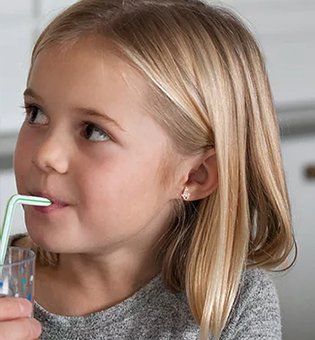Feeding Therapy
Common Feeding Issues
Problems with feeding and swallowing typically occur when there are a variety of medical or physical conditions which may include oral-motor chewing difficulty, dysphagia, feeding-tube dependency, "picky" eaters, and food/oral aversions.
Customized Therapy and Treatment Recommendations
Here at Interact Therapy, we are trained to treat infants, toddlers, and adolescents with a variety of feeding difficulties. These include oral-motor chewing difficulty, dysphagia, feeding-tube dependency, "picky" eaters, and food/oral aversions.
After an initial evaluation, we will provide you with therapy and treatment recommendations that are designed to meet the needs of you and your child.
Feeding Adversions/Delay
Some children gag or choke on food. Some children have sensory issues transitioning to solid foods or different textures. Open cup drinking and straw drinking may be challenging for others. Over-reactive or under-reactive children may only prefer certain types of foods, such as crunchy, spicy, bland. Your child may be beyond the ‘picky eater’ group and eat less than 20 foods or skip entire food groups. Shoveling food may also be noted.
Oral Motor Concerns
Some children swallow foods whole, while others drool and spill food from their mouth. A clicking sound with their tongue and roof of mouth may also be heard while children eat. An infant might have spillage from their mother’s breast or bottle. Inadequate tongue movement to clear food from their oral cavity. Pocketing of food in his/her cheeks during or until after the meal.
Feeding Milestones
4-7 Months
Babies are introduced cereal such as rice or oatmeal. Stage 1 and 2 puree baby foods.
8-10 Months
Cup drinking begins at 8 months. Mashed table foods, hard munchables like a large raw carrot, and a meltable food such as a graham cracker may be introduced. Gagging is considered normal.
10-12 Months
Small, soft cubed foods introduced. Rotary chew begins to emerge.
13-15 Months
A child should be able to keep most bites in their mouth during chewing. They chew and swallow firmer foods without choking.
16-18 Months
Children become efficient at finger feeding. Should be weaning off baby food purees and introducing more challenging foods, such as meats and vegetables.
19-24 Months
More control of cup drinking and increased utensil use. Children should be able to eat all consistencies from each food group.
Making an Appointment
Contact Interact Therapy via
our
contact form, by emailing us at
snelson@interact-therapy.com, or by calling
(701) 532-1906.
Physician referrals may be faxed to (701) 532-1896.
Wondering if your child needs a feeding evaluation? Some common referral criteria include: delay in feeding milestones, weight loss or lack of weight gain for 2-3 months, irritability surrounding meals, food refusal or very limited diet, persistent gagging or coughing while eating.
Preparing for Your Visit
Please bring the following to your child's visit:
- Copy of insurance card
- Completed 3-day food diary
- A list of food/drinks your child likes as well as doesn't like
- Bring typical utensils, cups, and bottles your child likes
During Your Visit
You will meet with the SLP or OT to discuss concerns about your child, review past medical history and feeding history and evaluate your child’s oral-motor feeding skills. Your child will then be evaluated on his/her refusals or sensory responses to foods by trialing a variety of textures and foods from each food group. Recommendations may be made by the therapist at that time. The appointment will range from half hour to one hour. If therapy is recommended, the frequency will be determined by the therapist during the evaluation.



Share On: